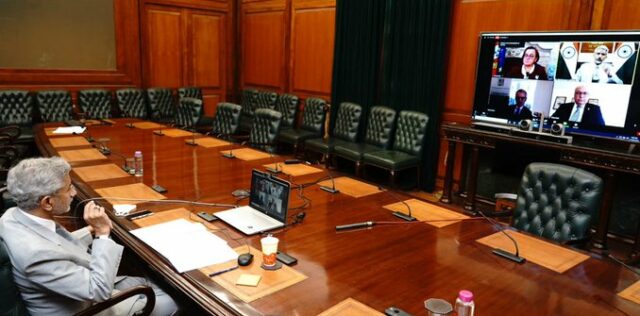NEW DELHI: External Affairs Minister S Jaishankar has made no secret of the need to cultivate Europe and this is something that India has focussed on in recent times. With a GDP of around $20 trillion and with India bound in strategic partnerships with two major countries – Germany and France – New Delhi has already been giving new momentum to the relationship with Foreign Secretary Harsh Shringla recently visiting London, Paris and Berlin.
Jaishankar says the EU should not view the region solely from an economic perspective as had often been the case in the past. “I don’t think the EU should look at Asia solely from an economic prism because economic issues are affected by non-economic factors. There is now an EU-India policy which I welcome and there is now an Indo-Pacific policy from countries such as Germany and France. We would like to see a strategic EU, a strategic EU which has an Asia and world strategy. I think that’s good for the world and that’s good for India. I certainly hope that is the direction in which you are going.”
He was speaking at a webinar organised by the Centre for European Policy Studies on Wednesday.
But while Jaishankar may have stressed the need to focus on ‘non-economic factors’ the sticking point, especially from Brussels’s side has been the lack of an FTA for which talks collapsed altogether in 2013. Asked whether he thought dialogue could begin again on this issue the minister replied, “We have spoken over the last five years over the need to resume negotiations. We want a fair and balanced FTA, but frankly to negotiate such an FTA with Europe is possibly one of the most difficult negotiations in the world because it will be a very high standard FTA. My sense is that conversations are still being had about this. On the EU’s side there are suggestions like ‘should we do a separate agreement on investment,’ and on India’s side ‘can we do an early harvest sectoral agreement’.”
The EAM stressed that getting a business deal on the table would cement what he called India’s ‘economic multipolarity.’ “In a multipolar world, there is a very simple rule. If you advance on any account, you advance on all accounts. For me, my economic accounts are the US, EU, China, Asean and the Gulf. India need to move forward on all five poles to secure its economic future. If we fall back on of these poles, we fall back on all the other poles too.”
Asked why India had opted out of RCEP trade deal signed earlier this week, Jaishankar said: “We had indicated our reservations over a year ago at the last East Asia summit in Bangkok. Given the way it is shaped currently RCEP is not in our interests because it would have fairly immediate negative consequences for our economy. But I must stress that what we did on RCEP is not our generic position vis a vis trade,” adding “If you give me a better product in Europe, I will be very happy to look at it.”
On the UN, the EAM made a veiled reference to China. “If people across the world are pointing out shortcomings and relevance of the UN, the 75 year-old body needs to refresh and relook at itself. We cannot let the interests of one or two countries who want to freeze history for their perpetual gain to continue.”
The minister once again pushed forward India’s case for the EU and the world at large to take a more active role in combatting terrorism. “There are three issues which are global, one is climate change, one is health, and one is terrorism. Climate change we accept, global health we are seeing through the pandemic. We have to put terrorism up there with those two issues.”
Jaishankar emphasised India was already playing a key role in all three of the global challenges. On the pandemic, he said “We take our responsibility of being the pharmacy to the world very seriously. Now the focus has shifted to vaccines, we are part of any international initiative dealing with COVID.”
















